How To Make Your Real Christmas Tree Last Longer
Our favourite way to kick off the festive period is to head to our local Christmas tree farm (hello Duff Christmas Tree Farm in Buchlyvie!) and find the perfect tree. It’s a bit like the 3 bears – that one’s too short; that one’s too bare; that one’s too skinny; that one’s lopsided. We’re very judgmental when it comes to Christmas trees! However, once we have done the difficult part of finding the perfect tree and getting it home, here’s what needs to be done next to make your real Christmas tree last longer…
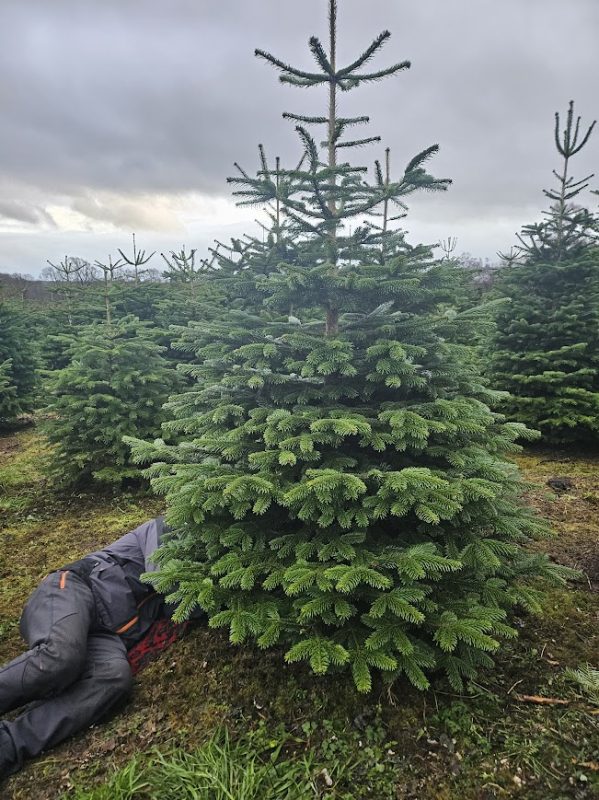
Find the perfect tree then chop it down!
How To Make Your Real Christmas Tree Last Longer
1. Cut trees quickly excrete a layer of sap and that will stop any water being sucked up so you need to slice another part off the trunk and immediately let is stand in a bucket of water OUTSIDE for 24 hours.
2. The next day you can pop your tree into its stand and bring it indoors but make sure there is plenty of water in the stand. For the first day indoors, check the water levels regularly – you will be amazed at how much water the tree will suck up and it must never run dry. If it runs dry it will create that layer of sap again and not suck up any more water and will quickly dry out. A dry tree will quickly lose its needles and we don’t want that!
3. Locate your tree away from a radiator or if you have underfloor heating it pop it on a plinth to raise it up a bit.
4. Check the water levels of your tree every day and evening for the rest of the festive period and top up as required.
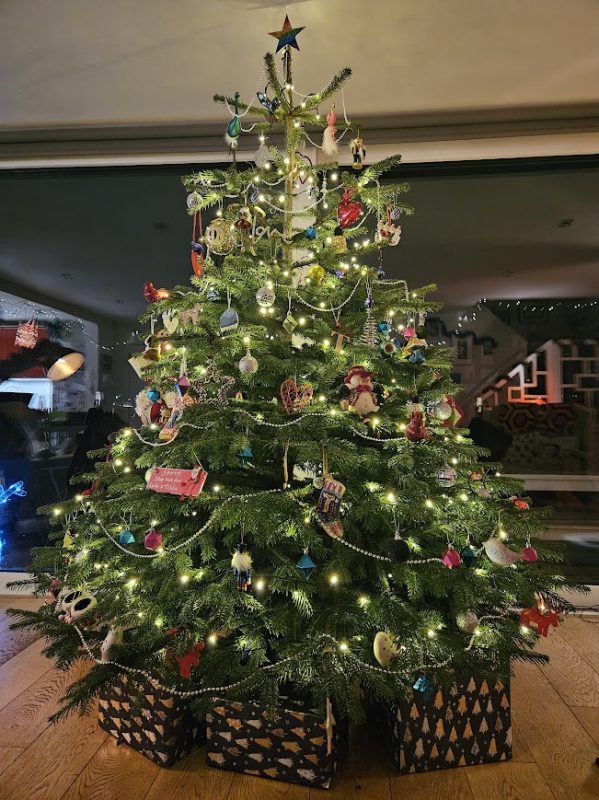
Our decorated tree
If you do this then your tree should still be looking great well into the New Year.
If you can, cutting down your own tree is a great option as you know it is freshly cut. Sometimes the trees you get in high street stores may have been cut down some time ago. If you are able to support a local farm and know more about where your tree came from, is it from a sustainable source and when was it felled then that will make a great difference too.
Hopefully that helps keep your tree in tip top condition throughout the festivities.
For more info on choosing real v artificial Christmas trees click here.
To learn more about different types of real trees click here.
Merry Christmas
All at Vialii
Christmas Trees Vialii Style
Real Christmas trees are available form a range of suppliers now. At Vialii Towers we much prefer them to artificial ones. Some people may argue that an artificial tree is better for the environment as you can use it for many years, but there is still a huge impact on the environment by making it in the first place, shipping from across the world and then disposing of it eventually. Plus a real tree smells wonderful and can be bought from local producers and even charities. We tell you which varieties of Christmas trees to consider, what to look for when you are buying and how to best look after them.
The vast majority of real Christmas trees sold have their roots cut off. To lessen the environmental impact we’d therefore recommend buying from a supplier who plants more trees to replace those they cut. Trees with roots are sometimes available but they can only be housed inside for a short period of time before they come out of the dormant phase. That means they’d need a slow and gradual return back to the cold if subsequently planting outside.
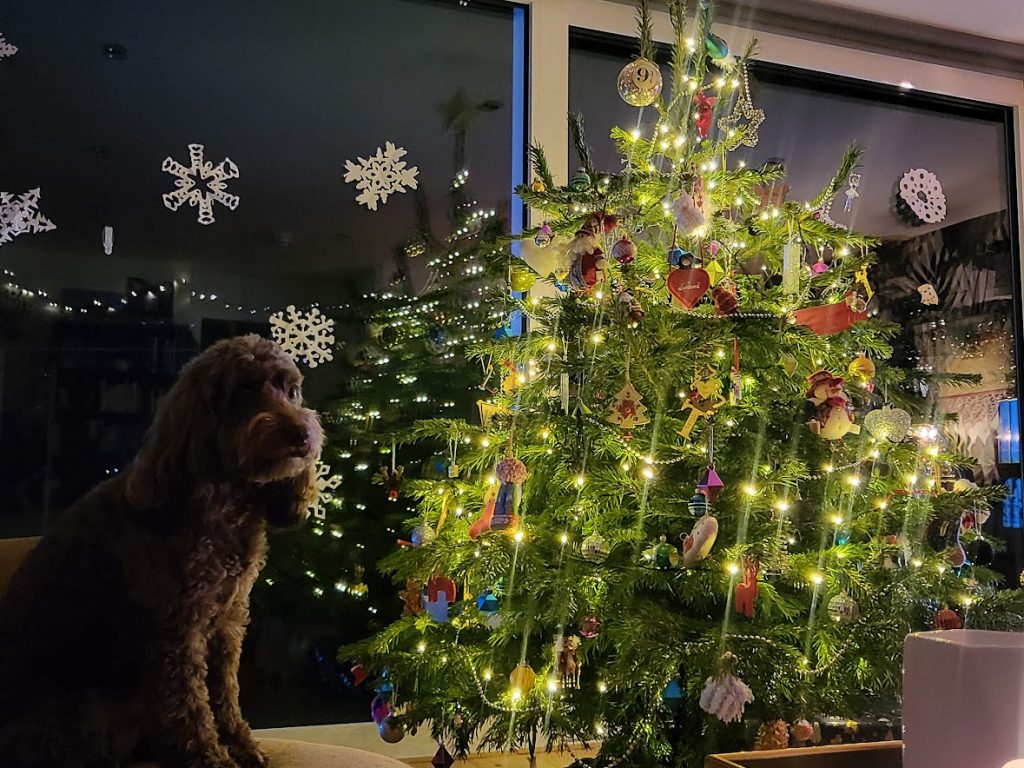
Noodle with our real Christmas tree
Which Christmas trees should you buy?
If you are buying a real tree, what variety should you go for? The answer depends upon the space you have, how worried you are about needle loss and how important a scent is. Here are a few of the most common Christmas trees you will find for sale and some of their key features:
Nordmann Fir
It has lovely deep green foliage with slightly blue tinge underneath. It normally has nice symmetry and shape and is less likely to drop its needles. No wonder it is by far the nation’s most popular.
Norway Spruce
Lovely scent but can be very prone to losing needles. Best to hold off on buying until nearer Christmas if this is your choice.
Fraser Fir
An ideal choice for smaller spaces due to a more compact pyramid shape. Needles tend to be less prickly and so more family friendly. Has a gentle citrus scent.
Noble Fir
Has low needle loss, good branch firmness, lovely scent and soft needles. Down side is that it can be hard to find.
Scots Pine
A sturdy option and the only native tree you’ll find on sale. Good needle retention and highly scented.
Lodgepole Pine
Slender straight tree with yellow-green tinged needles. Needle retention is generally ok.
Top buying tips
- Before leaving home, measure your space where the tree will be going (including the height) so that you buy the right size of tree (allow for a stand and decorations!)
- Ask the retailer where the Christmas trees were grown and when they were cut. You don’t want one that has been sitting around for weeks.
- Give the Christmas trees a good shake. If the needles are already falling off you should choose another.
- Lift the tree up. A freshly cut tree should feel heavy as it will have a high water content.
- Don’t buy Christmas trees that’s pre-wrapped unless you can get it opened and re-wrapped. You need to see it out so you can see the shape, make sure it has good symmetry, and how it will fit in your space.
Tree care
A good quality, freshly cut tree can last up to 6 weeks if well looked after:
- Saw a centimetre off the trunk before bringing it in to the house. This will help it draw up water.
- Don’t place it beside a radiator, a cooler corner is better.
- Water it everyday to minimise needle loss.
- Remember to recycle your real Christmas trees once Christmas is over. Most councils will collect your tree and will then chip them and re-use the material as a mulch.
Other decorations
Christmas trees are not the only plants that can bring a bit of festive cheer to your home. Here are some suggestions for unusual and elegant plant based decorations to make or buy:
As lovely as traditional holly wreaths are, you can give them a more contemporary twist by including scented plants such as lavender or thyme. Or be eco friendly and use trimmings from the garden like we do.
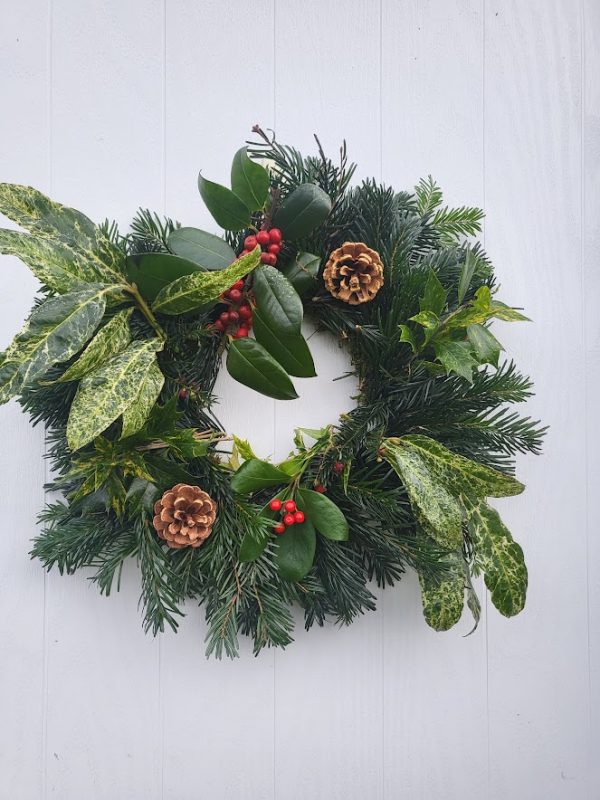
Our home made wreath
A stunning but simple table decoration can be made by placing holly leaves and berries in clean jars, adding water and topping with a floating candle. Just remember to keep away from children and pets and never leave unattended.
Terrariums are bang on trend this year and we’ll be hanging a seasonal bauble shaped one on our tree. These can come with airplants or with scented spices and dried fruit such as orange, apple and cinnamon sticks.
Or add some lovely lights to the outside of your home to bring some Christmas cheer.
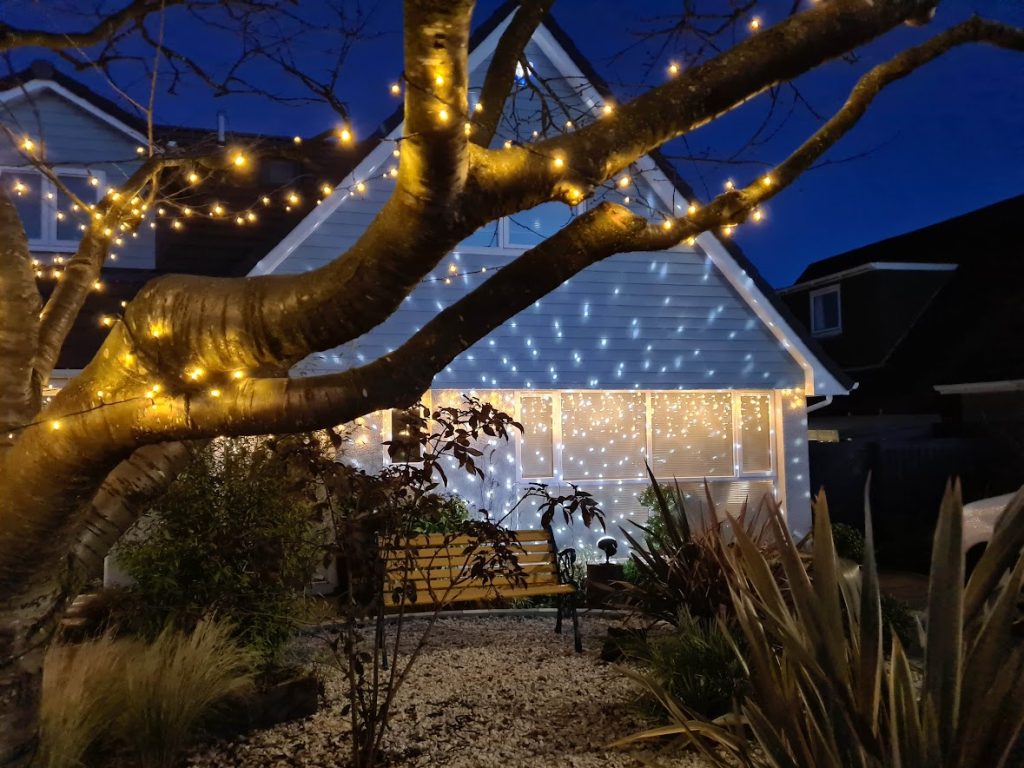
Our house lit up with some festive lights
Hopefully that has given you some inspiration to start thinking about Christmas trees and decorations for this year.
Merry Christmas from all at Vialii
Fir Trade!
I am soooo excited. You may have noticed Santa is busy getting ready for Christmas and is making lots of appearances at garden centres, shopping centres and even on trains! There is only five weeks to go so you better get your letters written and brush up on your good behaviour. One of my favourite things about Christmas is the tree, especially trying to climb it! There are lots of questions about whether a real or artificial tree is better for the environment, which variety of real Christmas tree to get, how to stop the needles falling off etc. So as usual, I’m at hand to answer all your questions as well as give you a little Christmas Tree decoration project to do…

Daddy and I with a real Christmas tree
Real or Artificial?
Now whilst some may claim that an artificial tree is better for the environment as you re-use it every year, there is still a huge impact on the environment by making it in the first place. Most are made from PVC which, from an environmental perspective, is a pretty horrible material. When you are fed up with your artificial tree and you throw it out, it will likely linger in land-fill for CENTURIES – not a great legacy to leave behind! Also, there is the carbon footprint to consider as most of the trees are made in the Far East and have to be shipped over here.
At Vialii, we believe that a real Christmas tree is much more environmentally friendly as long as you buy it local to where it was grown and that there is a re-planting commitment for all trees that are felled. Plus they smell lovely! A good quality, freshly cut tree can last up to 6 weeks if well looked after so don’t worry that you can’t put your tree up as early as the fakers! If I’m not convincing enough, consider this…A study in 2009 (Ellipsos) concluded that a 7-foot cut tree’s impact on climate is 60 percent less than a 7-foot artificial tree used for six years.
Living Christmas Tree
You can buy a live tree (with roots) but you can only have it indoors for a very short time and you will need to keep it in a cool place as it will come out of its dormant phase (in other words wake up!) and may not survive when you plant it back outdoors in the cold. If you are putting a live tree back outside you will need to acclimatise it back into the cold. If you find a supplier of cut trees who will plant lots more trees for every one they sell we think that’s the best compromise.
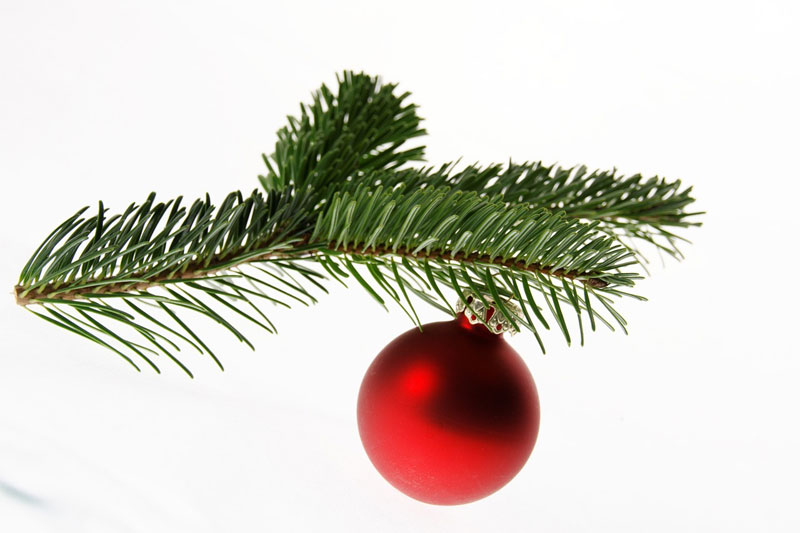
What’s the best type of Christmas tree for you?
What is the best type of real Christmas tree to buy?
OK, now that we have convinced you to get real, which variety should you opt for? Here are a few of the most common Christmas trees you will find for sale and some of their key features:
Nordmann Fir – the King of the Christmas Tree accounting for a huge 80% of UK sales. It has lovely deep green foliage on the top and blue underneath. It has lovely symmetry and shape and is less likely to drop its needles.
Norway Spruce – another popular choice and one which has a lovely smell. This one can be more likely to drop its needles so watch out and don’t buy it too early.
If you can find it, the Noble Fir is a great choice for needle loss, branch firmness, scent and the softness of the needles.
Fraser Fir – this one has a pyramid shape and soft needles which can be more family friendly. It has flat green needles and can be narrow making it a good choice to smaller spaces.
Top tips for looking after your real Christmas tree:
- Measure your space where the tree will be going (including the height) so that you buy the right size of tree (allow for a stand and a star on top!)
- Ask the retailer where the tree was grown and when it was cut.
- Give your tree a good shake. If the needles fall off then choose another.
- Lift the tree up. A freshly cut tree should feel heavy as it will have a high water content.
- Don’t buy a pre-packaged tree – you need to see it out so you can see the shape, make sure it has good symmetry, not too bare and will fit in your space. Most places will be happy to open up any that are already packed to let you see them and then re-wrap.
- Cut a centimetre or so off the trunk before bringing it in to the house to help it absorb water better.
- Choose a cooler corner of your room and make sure you water your tree EVERY day to minimise needle loss.
- Many charities sell Christmas trees so consider buying from one of these sources and spread some festive cheer.Remember to recycle your real tree once Christmas is over. Most councils will collect your tree and will then chip them and re-use the material as a mulch.
Now that I have helped you choose your Christmas tree, here is a fun project to make your own Christmas tree decoration…
Hand Print Santa Decoration
- Pencil
- Scissors
- White card
- Pink paper, card or paint
- Red paper, card or fabric
- Googly eyes
- Cotton wool
- Some ribbon, wool or string
- Glue
To make:
1. Ask your grown up to help you draw round your hand on some white card then cut it out. This will be the beard.

Draw round your hand on a piece of white card
2. Cut out an oval shaped face from the pink card (or use more of the white card and paint it pink or glue on some pink paper).

Here I am gluing some pink paper to my Santa’s head
3. Cut a hat shape from the red card (or use white card and glue on your red fabric/paper). Glue some cotton wool along the bottom of the hat and a cotton wool pom pom to the top.

Make your santa hat. I added some red tissue paper to mine and cotton wool.
4. Glue your cut-out hand (the beard) to the bottom of the face and glue the hat to the top of the face. Glue the googly eyes onto the face and attach the ribbon so that you can hang it on your tree.

I love a googly eye!
5. Hang your beautiful hand-made decoration on your tree. Lovely for Christmas and a wonderful keep-sake.

Our Santa Hand Christmas tree decoratio
Remember, don’t be naughty…I’d love to see pictures of your Christmas trees and your own hand made decorations so please send them to me.
Lulu
Thank you to Parents.com for the inspiration behind this decoration